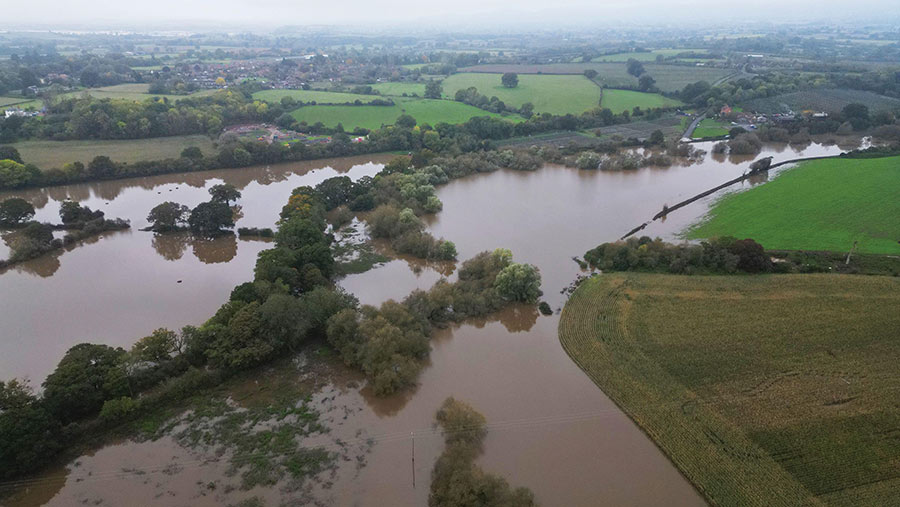NFU campaign demands political action on farm flooding
 Storm Babet damage © AlamyStock/Thousand Word Media Ltd
Storm Babet damage © AlamyStock/Thousand Word Media Ltd The NFU is rallying member support for an open letter campaign which urges all political parties to set out their plans to protect farmland from flooding.
Following the devastation caused by Storm Babet last week, with vast swaths of farmland underwater, Storm Ciaran is expected to inflict further flood damage to farms across England and Wales from Thursday 2 November.
More than half of most fertile agricultural (Grade 1) land in England is situated on floodplains and is susceptible to flooding, the union estimates.
See also: Q&A: What are your rights when farmland is flooded?
But chronic failure by the government to invest in and maintain watercourses is leaving many farmers reluctant to develop their businesses, threatening food production and UK food security, the NFU warns.
The open letter calls on the Environment Agency (EA) to deliver a proactive plan for the watercourses and flood defences it manages. Farmers who allow their land to be intentionally flooded to protect homes and businesses downstream must also be paid fairly for the public good they are providing, the letter says.
In addition, the NFU is calling for changes to the Flood Defence Grant in Aid cost-benefit analysis to ensure that rural communities are not disadvantaged by the nature of smaller populations in comparison with urban areas.
‘Find solutions’
Launching the letter, NFU deputy president Tom Bradshaw told Farmers Weekly: “We have got to find the political party that is willing to find solutions and take action on river maintenance.
“Farmers need to know: are they going to have to get used to being flooded, or are they going to take action?”
Mr Bradshaw said members were already facing a difficult winter, but the impact of extreme weather events, from flooding to drought, were adding to their financial woes.
After a very challenging harvest, farmers are struggling with high costs and significant reductions in basic payments this autumn.
The persistent wet weather is also causing huge problems on the ground, with widespread reports of recently sown winter cereals underwater, raising fears of huge financial losses. Potato and maize crops are still to be harvested, and the sugar beet harvest is on the horizon.
John Charles-Jones, who farms at Woodborough in Nottinghamshire, said over the past decade climate change had had a very significant impact on cropping intentions for “straightforward” combinable crops.
This autumn, he has planted only about 30% of winter cereals at his 240ha mainly arable farm, where spring cropping will now make up the balance.
Mr Charles-Jones has been proactive in taking significant action in building natural flood management features on his farm this summer.
Investment needed
“We need a lot more money to fund natural flood management features in order to help protect our local communities,” he said.
“Money needs to be thrown at this problem in a variety of different ways – whether it’s the cleaning out of waterways to prevent flooding of farmland, or compensation for farmers whose land has knowingly been flooded.
“We are happy to sacrifice several acres for natural flood management. But farmers are not just philanthropists who can just dole out money. Equally, nor should they be expected to be.
“Everything we are seeing now is a result of climate change, and all the predictions say that it’s going to get worse. What we are seeing now is the norm, not the exception.”
